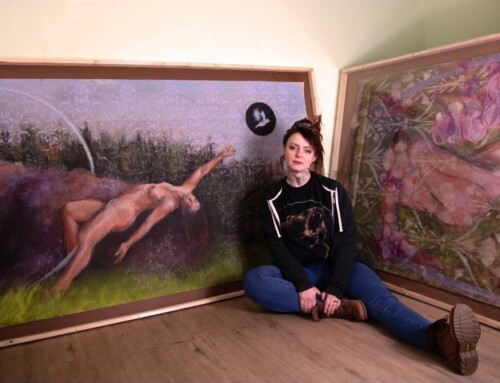Brian Doyle grew up in an Irish Catholic family with seven brothers and sisters in Queens, N.Y. where they spoke Irish Gaelic at home.
“My grandmother lived with us and she taught us our first Gaelic,” Doyle said. “Póg mo thóin [CQ]. It means kiss my butt in Gaelic.”
That’s one of many snapshots author Brian Doyle shared of his life during his keynote speech before a packed dining room at Jewell Gardens’ Poppies for the seventh annual North Words Writer’s Symposium.
About 30 writers from across Southeast, and some from as far way as New York and Tennessee, attended the symposium this year.
Doyle is known for his unorthodox and rule-breaking writing style. His work is often characterized by paragraph-long, run-on sentences peppered with adjectives and adverbs to weave a complex and robust narrative. He is the editor of Portland Magazine at the University of Portland, the author of numerous works of fiction, non-fiction, essays and poems.
His most recent novel, “Martin Marten,” encapsulates the coinciding coming of age stories for a teenage-boy just before he begins high school and a pine marten as he leaves his family to makes his own way through the wilderness.
Symposium co-organizer Jeff Brady first came across Doyle at a book show in Portland, Oregon, where he gave a speech to introduce his recently released book “Chicago.” Brady said he immediately knew Doyle would be a great fit as the keynote speaker for the symposium.
“We were looking for a fiction writer,” Brady said. “The plus with him is that he’s also a magazine editor, so he’s got a wealth of experience and could lend a lot to everybody who attended.”
Doyle extolled the importance of telling stories to his North Words audience, no matter what size or where they come from.
“This is a tribe, a guild, a clan of inky storytellers,” he said. “In every single place, people have been sitting around the fire telling stories for a million of years, and you are the straight descendants of those storytellers around the fire and what you do is crucial.”
Doyle said that every writer experiences a turning point in his or her career that defines what kind of work they are going to produce.
“For me, it was September 11th that turned me from one kind of a guy to another kind of a guy,” he said. “Three of my friends were murdered on September 11th.”
Two were working on the 57th floor of the north tower that morning, and the other on the 53rd floor of the south tower.

Photo by Julianne Stanford | Author Brian Doyle delivering the keynote speech at the 7th Annual North Words Writers Symposium.
Doyle decided it was his job to tell the story of the lives impacted by the tragedy, rather than the stories of terrorism and vengeance that were dominating the narrative. So he wrote a series of seven essays to celebrate the lives of the victims, including those of the firemen who ran up the Twin Towers’ stairs while knowing they might not come back down.
“A friend of mine was a fireman that day, and I said ‘why did those guys run up those stairs? Could you put out a fire on the 100A floor?’ and he said ‘nope.’ And I said ‘why did they run up there?’ and he said, “I don’t know, Brian. We don’t have a word for it. Why don’t you find out, you’re a writer?” Doyle recounted. “And I’ve been looking for that word ever since.”
Doyle said it’s moments like these that must be shared.
“For me, every time there is a moment of unbelievable horror like that, I think find the story in there, in that rubble and that ash, in that horror there is a story of unbelievable grace and courage,” he said. “Tell stories that are bigger than the bad story. That’s your job.”
And in Southeast Alaska, a story that deserves to be told is bound around every corner, just as local authors and North Words faculty members Eowyn Ivey, Heather Lende and Kim Heacox have done.
These authors and the stories they have told were one of the reasons why symposium participant Katie Bausler came back this year after attending for the first time in 2013.
“I came back because my Southeast Alaskan literary heroes were here, and I just loved being able to spend the weekend with them in a relaxed environment and get inspired and gain some insights, some nuggets of wisdom during the session, or one on one, or maybe over a beer in downtown Skagway,” she said.
Bausler is no stranger to having her work published, but the symposium gave her the push to step outside of her comfort zone. She writes a freelance column for the Alaska Dispatch News every couple of months and has been published in the University of Alaska Southeast literary journal Tidal Echoes. In her spare time, she has completed manuscripts and a series of essays that are yet to be published.
After attending the symposium, “I just feel like I’m ready to submit my work to other publications, maybe even publishing my own collection of essays,” she said.
Bausler said the she’s gathered many good writing tips from attending the symposium and the keynote speakers like Doyle.
“In order to pass on your experience to someone else, your reader, you need to have your five senses attenuated yourself, so when some kind of an insight comes to you or you hear a line of dialogue in a public place, or you have a moment of inspiration, or a couple of great sentences come into your mind, you need to write that down,” she said. “If you don’t write it down, it can be lost.”
While she has attended other writer’s workshops, Bausler said North Words is still one of her favorites because of the sense of community she has found there.
“I’ve been to other literary conferences where you just don’t feel as connected to the faculty,” Bausler said. “They might be these people who you feel a degree of separation with, whereas here it just sort of seems like we’re all writers together here trying to figure things out together.”
The plans for next year’s North Words symposium are already in the works despite recent criticism over the use of municipal money to fund its events.
At an assembly meeting in April, Chilkoot Trail Outpost owner Kathy Hosford lodged a complaint over the municipality’s funding of the symposium, objecting on the basis that the symposium “is publicly funded and a handful of private people benefit,” and that it “is a platform for participants and faculty to benefit.”
The symposium received $12,500 from the municipality this year through the Conventions and Visitors Bureau.
However, that wasn’t the event’s only source of funding. It receives privately raised donations, including a $5,000 donation from co-organizer Brady himself.
“We still want to be under the auspices of the city, which has been wonderful, but we might want to form our own non-profit and another non-profit in the community to run it,” Brady said. “But hopefully with the same support from the city.”
Keynote speaker Doyle wrote a letter to Skagway Borough Manager Scott Hahn on June 1 to laud the benefits the entire community sees from the symposium.
“It seems to me that whatever the city is paying for it, it’s well worth the cost,” Doyle wrote. “The keynoters are always noted authors, which brings people to Skagway. And the participants, as far as I could tell, come from all over. I’d imagine that they are excellent word of mouth agents now for Skagway, as are the rest of the folks who have come up there, been moved and impressed, and not only come back themselves but talk up the city and its attractions in their own regions.”





Leave A Comment